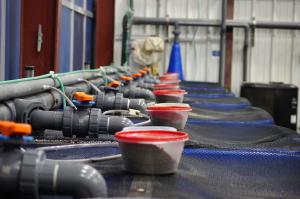Unstable Feed Supply Could Limit Aquaculture’s Growth, Study Warns
Scientists outline pathways to resilient aquaculture production; sustainable blue food innovation
TUSCON, AZ, UNITED STATES, November 4, 2025 /EINPresswire.com/ -- Aquaculture’s rapid expansion could be limited by its continued reliance on a fragile feed supply, according to a new study published in Nature Food. The findings underscore how closely the sector’s future growth remains linked to the very ocean it seeks to relieve.The analysis, conducted by researchers from Xiamen University, University of Massachusetts, Boston, University of Arizona, and University of Tasmania, found that despite major progress in using fishmeal and fish oil more efficiently, the aquaculture industry would need to secure an additional 1.8 million metric tons of alternative feed ingredients each year to keep pace with rising global demand for high-value farmed seafood such as salmon and shrimp.
“This is a practical moment to secure feed supply and unlock new value streams,” said the study’s lead author Ling Cao, a professor at Xiamen University and judge of the F3 Challenge. “Treating fishmeal and fish oil as strategic, finite resources, while accelerating alternative innovations, can help sustain aquaculture growth and reduce exposure to supply variability.”
Aquaculture has emerged as the fastest-growing food production sector worldwide, supplying more than half of the world’s seafood and nearly one-fifth of all animal-sourced protein. As the global population approaches 10 billion by mid-century, aquaculture’s continued growth is essential to meet our global food security needs. In a historic milestone, total global aquaculture production surpassed that of wild-capture fisheries for the first time in 2022, underscoring its critical role in meeting the world’s growing demand for seafood.
The researchers used a novel shortfall impact model to examine how varying forage fish supply scenarios affect global fed aquaculture. They found that climate change and fishery management restrictions could reduce global forage fish catches by nearly 20 percent, potentially causing a 35 percent decline in global fed aquaculture output—and more than 70 percent reductions for some high-value farmed species if alternative feed ingredients are not scaled.
“Aquaculture has already made big strides in squeezing more value out of every kilogram of fishmeal and oil use,” said coauthor Kevin Fitzsimmons, a professor at the University of Arizona and judge of the F3 Challenge. “Continued progress will come from expanding supply options and advancing technologies in feed formulation and circular resources use.”
The takeaway for industry leaders from this study is clear: fishmeal and fish oil should be treated as strategic but finite resources with variable and volatile availability and cost. By accelerating the use of alternative ingredients—such as microbial, algal, insect-based, and next-generation plant proteins and algae oils—and pairing these with advances in breeding, feed formulation, and circular waste streams, the sector can position itself as a frontrunner in sustainable blue food innovation.
Recent market events illustrate this need. The 2023 closure of Peru’s anchoveta fishery—one of the most significant in recent years—caused major disruptions in global fish oil supplies and posed challenges for aquaculture production. The gap left by this supply disruption was partially filled by commercially available algae-based oils, highlighting that the need for more scalable alternative feed ingredients is already evident and increasingly urgent.
The study was a collaborative research effort undertaken by the volunteer judges of the F3 – Future of Fish Feed initiative.
# # #
The Future of Fish Feed (F3) is a collaborative effort between NGOs, academic institutions, and private partnerships to accelerate the commercialization of innovative, substitute aquaculture feed ingredients to replace wild-caught fish.
Annie Reisewitz
MAR Communications
+1 858-228-0526
annie@marcom.llc
Visit us on social media:
LinkedIn
Legal Disclaimer:
EIN Presswire provides this news content "as is" without warranty of any kind. We do not accept any responsibility or liability for the accuracy, content, images, videos, licenses, completeness, legality, or reliability of the information contained in this article. If you have any complaints or copyright issues related to this article, kindly contact the author above.

